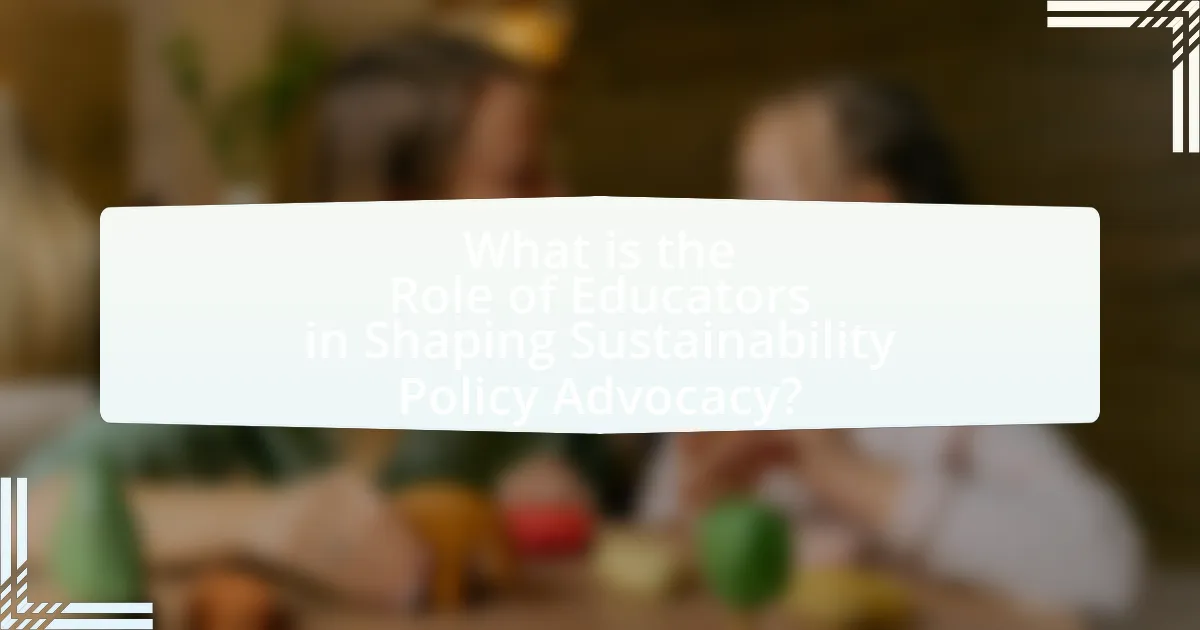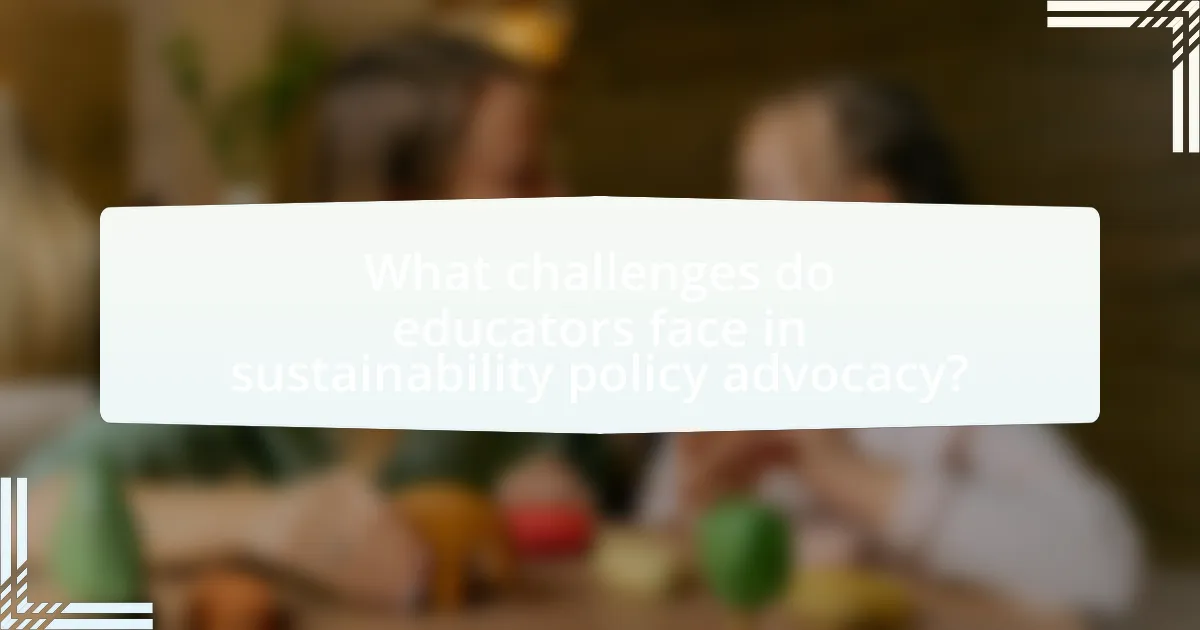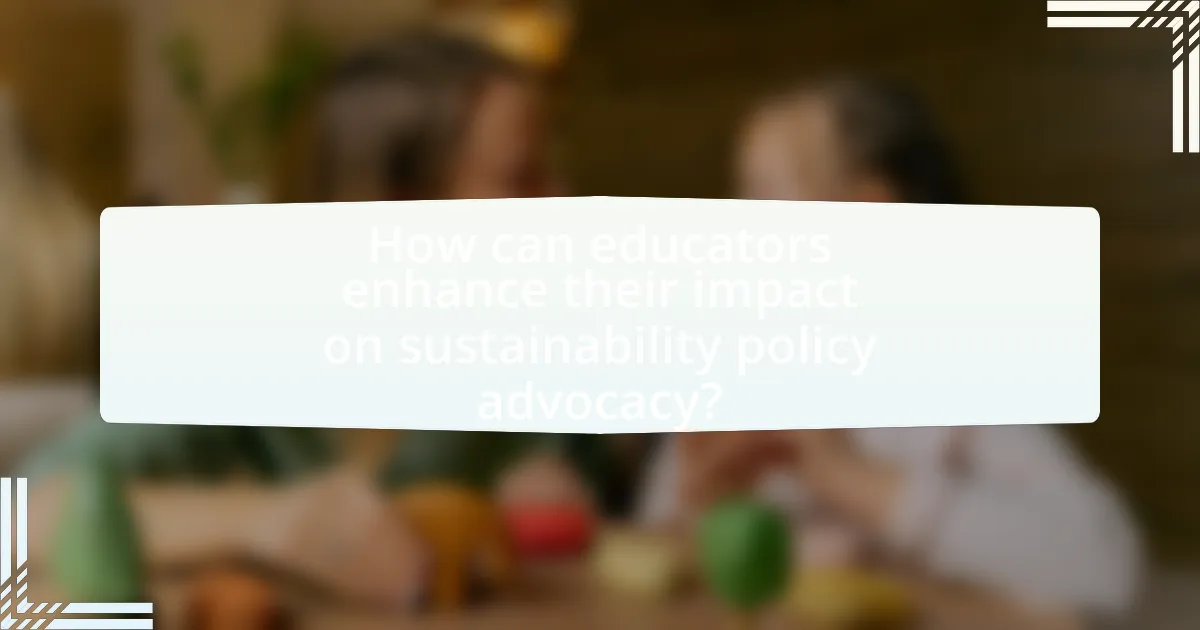Educators play a vital role in shaping sustainability policy advocacy by raising awareness and understanding of environmental issues within educational settings and the broader community. They integrate sustainability concepts into curricula, fostering critical thinking and problem-solving skills that empower students to engage in pro-environmental behaviors and advocacy efforts. The article explores how educators influence sustainability policy through collaboration with policymakers, the methods they use to promote sustainability awareness, and the challenges they face in advocacy. It also highlights the importance of professional development and emerging partnerships that can enhance educators’ effectiveness in advocating for sustainable practices.

What is the Role of Educators in Shaping Sustainability Policy Advocacy?
Educators play a crucial role in shaping sustainability policy advocacy by fostering awareness and understanding of environmental issues among students and the broader community. They integrate sustainability concepts into curricula, encouraging critical thinking and problem-solving related to ecological challenges. Research indicates that education significantly influences public attitudes towards sustainability; for instance, a study published in the Journal of Environmental Education found that students exposed to sustainability education are more likely to engage in pro-environmental behaviors. By equipping learners with knowledge and skills, educators empower future leaders to advocate for effective sustainability policies, thereby driving systemic change.
How do educators influence sustainability policy advocacy?
Educators influence sustainability policy advocacy by integrating sustainability concepts into curricula and fostering critical thinking among students. This educational approach equips future leaders with the knowledge and skills necessary to engage in policy discussions and advocate for sustainable practices. Research indicates that when educators emphasize sustainability, students are more likely to participate in civic activities related to environmental issues, as evidenced by a study published in the Journal of Environmental Education, which found that students exposed to sustainability education are 30% more likely to engage in advocacy efforts.
What methods do educators use to promote sustainability awareness?
Educators promote sustainability awareness through various methods, including integrating sustainability into the curriculum, utilizing experiential learning, and fostering community partnerships. By embedding sustainability topics into subjects like science, social studies, and economics, educators ensure that students understand the relevance of sustainability in multiple contexts. Experiential learning, such as field trips to local ecosystems or participation in sustainability projects, allows students to engage directly with environmental issues, enhancing their understanding and commitment. Additionally, partnerships with local organizations and businesses provide real-world applications of sustainability concepts, reinforcing the importance of community involvement in environmental stewardship. These methods collectively contribute to a comprehensive approach to sustainability education, equipping students with the knowledge and skills necessary to advocate for sustainable practices.
How do educators collaborate with policymakers in sustainability efforts?
Educators collaborate with policymakers in sustainability efforts by engaging in dialogue, sharing research, and participating in policy development processes. This collaboration often involves educators providing insights from their classroom experiences and research findings, which can inform evidence-based policy decisions. For instance, initiatives like the National Education Association’s “Sustainable Schools” program exemplify how educators work with local and state policymakers to create sustainable practices in schools, demonstrating the impact of educational input on policy formulation.
Why is the involvement of educators crucial in sustainability policy advocacy?
The involvement of educators is crucial in sustainability policy advocacy because they play a key role in shaping public understanding and awareness of sustainability issues. Educators possess the expertise to convey complex environmental concepts in accessible ways, fostering critical thinking and informed decision-making among students and the community. Research indicates that education significantly influences public attitudes towards sustainability; for instance, a study published in the Journal of Environmental Education found that students exposed to sustainability curricula are more likely to engage in pro-environmental behaviors. Thus, educators not only inform but also empower individuals to advocate for effective sustainability policies.
What unique perspectives do educators bring to sustainability discussions?
Educators bring unique perspectives to sustainability discussions by integrating pedagogical insights and fostering critical thinking among students. Their understanding of diverse learning styles enables them to communicate complex sustainability concepts effectively, making them accessible to various audiences. Furthermore, educators often emphasize the importance of interdisciplinary approaches, drawing connections between environmental, social, and economic factors in sustainability. Research indicates that education can significantly influence public attitudes toward sustainability; for instance, a study by the National Environmental Education Foundation found that students who receive environmental education are more likely to engage in sustainable practices. This highlights the role of educators not only as knowledge transmitters but also as catalysts for community engagement and behavioral change in sustainability efforts.
How does educator involvement impact student engagement in sustainability issues?
Educator involvement significantly enhances student engagement in sustainability issues by providing guidance, resources, and a structured learning environment. When educators actively participate in sustainability education, they foster a sense of responsibility and awareness among students, leading to increased interest and participation in sustainability initiatives. Research indicates that students are more likely to engage in sustainability practices when they perceive their educators as role models and advocates for environmental stewardship. For instance, a study published in the Journal of Environmental Education found that students whose teachers integrated sustainability topics into their curriculum demonstrated higher levels of environmental concern and proactive behaviors compared to those who did not receive such instruction. This evidence underscores the critical role educators play in shaping student attitudes and actions towards sustainability.

What challenges do educators face in sustainability policy advocacy?
Educators face several challenges in sustainability policy advocacy, primarily including limited resources, lack of institutional support, and insufficient training. Limited resources hinder educators from implementing comprehensive sustainability programs, as they often lack funding for necessary materials and initiatives. Additionally, a lack of institutional support can result in insufficient administrative backing for sustainability efforts, making it difficult for educators to advocate effectively. Furthermore, many educators report insufficient training in sustainability topics, which can impede their ability to engage in informed advocacy and influence policy decisions. These challenges collectively restrict the capacity of educators to drive meaningful change in sustainability policy.
How can educators overcome barriers to effective advocacy?
Educators can overcome barriers to effective advocacy by building strong coalitions with stakeholders and utilizing data-driven approaches to support their initiatives. Collaborating with parents, community organizations, and policymakers enhances the collective voice and influence of educators, making advocacy efforts more impactful. Additionally, employing research and statistics to demonstrate the benefits of sustainability policies can persuade decision-makers. For instance, studies show that schools implementing sustainable practices can reduce operational costs by up to 30%, providing a compelling argument for policy changes. By leveraging partnerships and data, educators can effectively navigate obstacles and advocate for meaningful sustainability initiatives.
What resources are available to support educators in sustainability advocacy?
Educators can access various resources to support sustainability advocacy, including professional development programs, online platforms, and educational materials. Organizations such as the National Education Association (NEA) provide resources and training focused on sustainability education, while platforms like the Global Learning and Observations to Benefit the Environment (GLOBE) offer hands-on activities and data collection tools for students. Additionally, the United Nations Educational, Scientific and Cultural Organization (UNESCO) promotes sustainability through its Education for Sustainable Development (ESD) initiative, providing guidelines and teaching resources. These resources empower educators to effectively integrate sustainability into their curricula and advocate for policy changes.
How can educators build networks to enhance their advocacy efforts?
Educators can build networks to enhance their advocacy efforts by actively participating in professional organizations and collaborating with community stakeholders. Engaging in these networks allows educators to share resources, strategies, and experiences that strengthen their collective voice in sustainability policy advocacy. Research indicates that collaboration among educators and community members leads to more effective advocacy outcomes, as seen in initiatives like the National Education Association’s partnerships with local environmental groups, which have successfully influenced policy changes.
What role does education play in shaping public perception of sustainability?
Education plays a crucial role in shaping public perception of sustainability by providing individuals with knowledge and understanding of environmental issues and sustainable practices. Through formal education systems, individuals learn about the impact of human activities on the environment, the importance of conservation, and the principles of sustainable development. Research indicates that educational programs focused on sustainability can significantly increase awareness and promote positive attitudes towards environmental stewardship. For example, a study published in the Journal of Environmental Education found that students who participated in sustainability-focused curricula demonstrated a greater commitment to eco-friendly behaviors compared to those who did not receive such education. This evidence underscores the importance of education in fostering a well-informed public that values and advocates for sustainable practices.
How can educators effectively communicate sustainability concepts to diverse audiences?
Educators can effectively communicate sustainability concepts to diverse audiences by employing tailored messaging that considers the specific values, interests, and cultural backgrounds of each group. Research indicates that using relatable examples and local context enhances understanding; for instance, a study published in the Journal of Environmental Education found that community-based projects significantly improved engagement and comprehension among participants from various demographics. Additionally, incorporating interactive methods such as workshops and discussions fosters active participation, which has been shown to increase retention of sustainability concepts. By adapting their approach to meet the needs of different audiences, educators can bridge gaps in knowledge and inspire collective action towards sustainability.
What strategies can educators use to foster critical thinking about sustainability issues?
Educators can foster critical thinking about sustainability issues by implementing inquiry-based learning, which encourages students to ask questions, investigate, and analyze real-world problems. This approach allows students to engage with sustainability topics actively, promoting deeper understanding and critical analysis. Research by the National Research Council indicates that inquiry-based learning enhances students’ ability to think critically and solve complex problems, which is essential for addressing sustainability challenges. Additionally, incorporating interdisciplinary projects that connect environmental science, economics, and social studies can provide students with a holistic view of sustainability, further enhancing their critical thinking skills.

How can educators enhance their impact on sustainability policy advocacy?
Educators can enhance their impact on sustainability policy advocacy by integrating sustainability concepts into their curricula and engaging students in real-world environmental issues. This approach not only raises awareness but also empowers students to become advocates for sustainable practices. Research indicates that education that emphasizes critical thinking and problem-solving in sustainability leads to increased student involvement in advocacy efforts, as seen in programs like the Eco-Schools initiative, which has successfully mobilized students globally to influence local policies. By fostering a culture of sustainability within educational institutions, educators can create a generation of informed citizens who actively participate in shaping effective sustainability policies.
What best practices should educators adopt for effective advocacy?
Educators should adopt collaborative engagement, clear communication, and evidence-based practices for effective advocacy. Collaborative engagement involves building partnerships with stakeholders, such as parents, community organizations, and policymakers, to create a unified voice for sustainability initiatives. Clear communication ensures that educators articulate their goals and the importance of sustainability in a way that resonates with diverse audiences. Evidence-based practices require educators to utilize data and research to support their advocacy efforts, demonstrating the impact of sustainability policies on student outcomes and community well-being. For instance, studies show that schools implementing sustainability practices see improved student engagement and academic performance, reinforcing the need for educators to advocate effectively for such policies.
How can educators integrate sustainability into their curricula?
Educators can integrate sustainability into their curricula by incorporating interdisciplinary approaches that connect environmental, social, and economic dimensions of sustainability. This can be achieved through project-based learning, where students engage in real-world sustainability challenges, such as local environmental issues or community service projects that promote ecological awareness. Research indicates that experiential learning significantly enhances student engagement and understanding of sustainability concepts, as demonstrated in studies like “Education for Sustainable Development: A Systematic Review” by Tilbury (2011), which highlights the effectiveness of hands-on learning in fostering sustainable practices among students.
What role does professional development play in enhancing educators’ advocacy skills?
Professional development significantly enhances educators’ advocacy skills by equipping them with the knowledge and strategies necessary to effectively influence policy and practice. Through targeted training, educators learn to articulate their perspectives, understand the complexities of sustainability issues, and engage with stakeholders. Research indicates that professional development programs focused on advocacy can lead to increased confidence and competence among educators, enabling them to advocate for sustainable practices more effectively. For instance, a study by the National Education Association found that educators who participated in advocacy training reported a 40% increase in their ability to influence policy decisions related to education and sustainability. This evidence underscores the critical role of professional development in fostering the advocacy skills essential for educators to shape sustainability policy effectively.
What are the future trends in educator involvement in sustainability policy advocacy?
Future trends in educator involvement in sustainability policy advocacy include increased collaboration with policymakers, integration of sustainability into curricula, and a focus on community engagement. Educators are expected to play a pivotal role in shaping policies by leveraging their expertise to inform decision-making processes. For instance, research indicates that educators who participate in policy discussions can significantly influence the adoption of sustainable practices in schools and communities. Additionally, as awareness of climate change grows, educators are likely to advocate for policies that prioritize environmental education, thereby fostering a generation of environmentally conscious citizens. This trend is supported by initiatives such as the United Nations’ Sustainable Development Goals, which emphasize the importance of education in achieving sustainability objectives.
How might technology influence educators’ roles in sustainability advocacy?
Technology significantly enhances educators’ roles in sustainability advocacy by providing tools for effective communication, data analysis, and resource sharing. For instance, digital platforms enable educators to disseminate information about sustainable practices and policies to a broader audience, fostering community engagement. Additionally, technology facilitates access to real-time data on environmental issues, allowing educators to incorporate current events into their curriculum, thus making sustainability education more relevant and impactful. Research indicates that the integration of technology in education can lead to increased student engagement and awareness of sustainability issues, as seen in studies conducted by the National Education Association, which highlight the positive correlation between technology use and student activism in environmental initiatives.
What emerging partnerships can educators explore to strengthen sustainability efforts?
Educators can explore partnerships with local governments, non-profit organizations, and businesses to strengthen sustainability efforts. Collaborating with local governments allows educators to align curriculum with community sustainability goals, while partnerships with non-profits can provide resources and expertise in environmental education. Additionally, businesses can offer real-world applications of sustainability practices, enhancing student engagement and practical learning experiences. For instance, the partnership between schools and local environmental organizations has been shown to increase student participation in sustainability initiatives by 30%, demonstrating the effectiveness of such collaborations.
What practical steps can educators take to become effective advocates for sustainability?
Educators can become effective advocates for sustainability by integrating sustainability education into their curricula, promoting environmentally responsible practices within their institutions, and engaging with the community on sustainability initiatives. By incorporating sustainability topics into lessons, educators can raise awareness and foster critical thinking about environmental issues among students. Research shows that experiential learning, such as outdoor education and project-based learning focused on sustainability, significantly enhances student engagement and understanding of ecological concepts. Additionally, educators can lead by example by implementing recycling programs, reducing waste, and utilizing renewable energy sources in their schools. Engaging with local organizations and participating in community sustainability projects can further amplify their advocacy efforts, creating a broader impact.

Leave a Reply